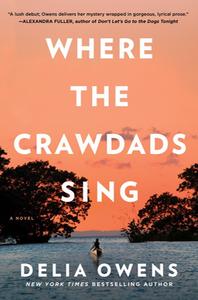_Dawn_Marie_Tucker.jpg)
|
|
| photo: Dawn Marie Tucker | |
You describe the North Carolina coastal marshes in such gorgeous and loving detail in the novel. Have you lived in that region?
I haven't lived in that region, exactly. I've visited quite a bit--often as a child and when I started writing the book, I took several trips to do a bit of research. I grew up in South Georgia, and I went canoe camping with my mother in the Okefenokee Swamp and other areas. So I know the ecosystem and the habitat quite well.
Kya is a strong, likable heroine. Was she based on anyone from your life?
Kya partly comes from my own background. I grew up as a tomboy--a lot of my friends were tomboys and my mother was a real outdoor girl. So, my life was similar in the sense that I spent a lot of my time outside with my friends, and I knew a lot of girls who lived like that. I got the expression in the title from my mother. She would say to us, "Go way out yonder where the crawdads sing." Maybe she was just trying to get us out of the house! But she wanted us to get out into nature and learn about wildlife.
Where did you get the idea for the novel?
I studied wildlife in Africa for 23 years and was particularly taken by the fact that mammals live in tightly bonded social groups--a pride of lions, a troop of baboons, a herd of elephants--the groups are made up of females. Males lead the groups, but they emigrate to other groups for mating. Females stay in their natal groups all of their lives. We as a species have a very strong propensity to live in our groups, especially females. I lived in isolation in Africa for years, and I felt the impact of not being with my "troop." Growing up, I had this amazing group of girls--my novel is dedicated to three of them--and we are still close to this day, but I was isolated from them for years. I wanted to write a novel about a young girl growing up in isolation and how that would make her different from other people.
 The other side of isolation is that Kya is self-reliant and independent, and that grows into wonderful things. She educates herself, she has ambition and she's determined. Even though Kya is in extraordinary circumstances, there is some of Kya in all of us, and that's what I wanted readers to feel. She's one in a million, but she's also all of us.
The other side of isolation is that Kya is self-reliant and independent, and that grows into wonderful things. She educates herself, she has ambition and she's determined. Even though Kya is in extraordinary circumstances, there is some of Kya in all of us, and that's what I wanted readers to feel. She's one in a million, but she's also all of us.What made you decide to write a novel, and how was that different from writing nonfiction?
I just wanted to write this particular story. I love the freedom of fiction. With nonfiction, you're always restricted by the timeline and the facts. I ride horses out here in the West. I can get out and ride my horse in the mountains and go anywhere. To me, writing fiction is the same feeling. You can ride your horse inside the corral, around and around, and that's nonfiction, but when you go through that gate and get your horse into a nice lope and run across the meadow and up the mountains, you can go anywhere you want... that's fiction! It's like soaring.
What do you hope readers take away from reading Where the Crawdads Sing?
I want people to understand the importance of knowing where our basic behavior comes from. A lot of what we do evolved while we were back on the savannas, eons ago where we had to protect ourselves and search for food, and a lot of those things are still in us. Until we understand who we were back then, we will never understand who we are now.
And my mother was right--it's important for us to go out, way out yonder where the crawdads sing, because that's where our secrets are. Spending time in nature is so important--it's our original home. I also want people to appreciate the value of a group. We need to reach out and find our "troop." When you're in a troop, you are giving to them, they are giving to you and you are sharing. Only good comes from that. --Suzan L. Jackson, freelance writer and author of Book By Book blog

